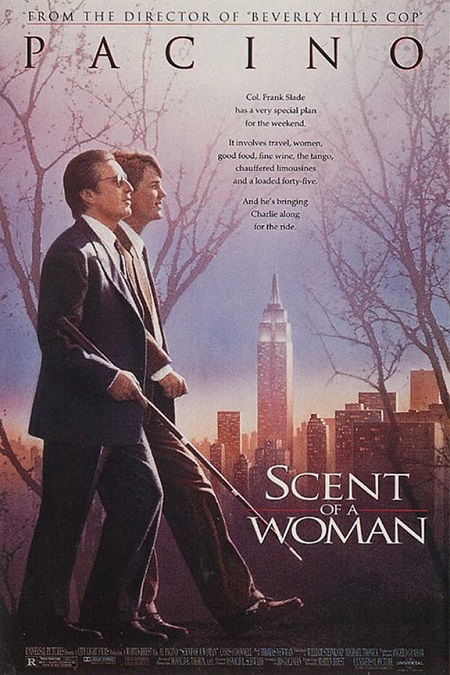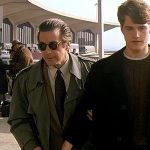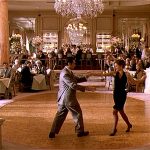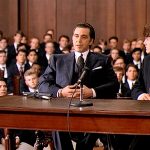
Scent of a Woman – 1992
This movie wasn’t bad. It wasn’t great, but it wasn’t as bad as I remember it being. You see, I had watched this movie many years ago and thought it was very slow and very boring. But now, after watching it again, I have changed my opinion. I still think it was very slow, but not as boring as I remember. The movie starred Al Pacino in an Oscar winning performance as Lieutenant Colonel Frank Slade, a mean, old, blind military retiree.
Opposite him is Chris O’Donnell as Charlie Sims, a 17 year old prep-school student who takes on the job of caring for Frank for a weekend. This was O’Donnell’s first leading role in a major film. Of course, Pacino got top billing. But as I go over the plot a little, you’ll see that the character of Slade was really the supporting role. The movie was really a coming-of-age film about Charlie’s journey from boyhood to manhood. Frank Slade was just the catalyst that facilitated Charlie’s transition.
O’Donnell’s performance was adequate, though a bit whiney. However, it was Pacino’s incredible performance that really made the movie. Apparently he did a lot of research in order to believably portray a man who could not see. He was actually pretty amazing. Throw in a brief tango scene with the beautiful Gabrielle Anwar, and you have yourself a movie. Unfortunately, like I mentioned, the pacing of the film was pretty slow. The movie was nearly two and a half hours long, and I think the same story could have been told in under two. For the most part, the plot was well-crafted, but the ending, which was supposed to be inspirational, was ridiculous, and consequently unrealistic. But I’ll get to that in a bit.
So Charlie is going to a fancy rich-boy prep school. He is poor, but he is a model student who is there on a scholarship. The main plot is about how his rich and spoiled hoodlum friends play a prank on the school’s headmaster. Charlie and the leader of the rich kids, George Willis, Jr., played by Phillip Seymour Hoffman, watch the pranksters setting the prank up, and are seen identifying them. The headmaster then threatens to expel Charlie and George if they don’t squeal on them. That’s the main plot.
But really, all anyone really remembers about the movie is Al Pacino. The character of Frank Slade has a much more interesting story-line, even though I would really call it a sub-plot. He is a mean, cantankerous, lecherous, old man, and he knows it. He is bitter about his disability. He drinks heavily and is a functional alcoholic. He lies to get what he wants. He habitually verbally abuses both friends and family members alike. There is no reason anyone in the world would like him.
To earn some extra cash, Charlie agrees to stay with him while the family that cares for him go on a vacation. But Frank manipulates Charlie into going on a big spree in New York City. They stay at the Waldorf-Astoria, eat at the Oak Room at the Plaza Hotel, hire high-class hookers, and test-drive a hundred thousand dollar Ferrari. Charlie reluctantly agrees to go along with frank until he learns that the spree is Frank’s last “Hoo-ah!” before committing suicide. And while I’m on the subject, that annoying catch phrase wasn’t quite as annoying this time around.
Apparently Frank is so depressed about his blindness and his inability to care for himself that he wants to end it all. Anyway, to make a long story short, Charlie and Frank become friends and the young man convinces the older man to go on living. But that brings us to the ridiculous ending. Charlie can either squeal on the rich kids, who he doesn’t even like, and get a free ride to Harvard, or keep silent and ruin his scholastic career. He chooses the noble path and stays silent.
But then Frank walks into the school’s public hearing. And after the jerk of a headmaster, Mr. Trask, played by James Rebhorn, recommends that Charlie be expelled, Frank stands up and makes an impassioned speech, praising Charlie and further shaming the headmaster. He flippantly tells the entire student body and the staff how Trask would rather crush the obviously innocent Charlie and excuse the obviously guilty George because his father is a major financial donor to the school. After his foul-mouthed speech, the rest of the faculty agrees to punish the rich kids and excuse Charlie.
OK, first, Trask would not have been able to punish Charlie with expulsion in the first place, because Charlie did not commit the crime. Second, as far as Trask knew, Frank was a stranger off the street, and he would not have been allowed to speak at the proceedings. Third, If Trask was enough of a jerk as to expel Charlie, knowing that he was being used as a scapegoat because he was in the wrong place at the wrong time, he would not have listened to the arrogant and crass Frank Slade. The verbal lashing would have been met with incredulity and dismissal, and rightly so. Frank had no right to interfere with the proceedings at a school with which he had never, in any way, been associated. So Frank ends up getting Charlie out of hot water, and Charlie ends up making Frank become a nicer person. If you ask me, it was just unrealistic.








